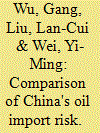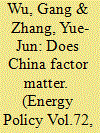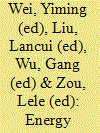|
|
|
Sort Order |
|
|
|
Items / Page
|
|
|
|
|
|
|
| Srl | Item |
| 1 |
ID:
090082


|
|
|
|
|
| Publication |
2009.
|
| Summary/Abstract |
In recent years, the international oil price has fluctuated violently, bringing about huge risk for the international oil trade. In fact, the risk of crude oil and petroleum product imports is different because of the different import origins and prices. Which import risk is lower for China? From the perspective of oil supply security, how should China portfolio crude oil and petroleum product imports to minimize its oil import risk? Using portfolio theory and a diversification index approach, this paper compares and analyzes the supply, price and transport risks of crude oil and petroleum product imports. Our results show that the following: (1) Specific risk (diversification risk) and marine transport risk of China's petroleum product imports are lower than that of crude oil imports. (2) The average rate of return of China's petroleum product imports is higher than that of crude oil imports. Moreover, the average import price variance of petroleum product imports is lower than that of crude oil imports. Thus, the systematic risk (price risk) of petroleum products is lower too. Therefore, from the perspective of oil supply security, China should increase petroleum product imports to decrease its oil import risk.
|
|
|
|
|
|
|
|
|
|
|
|
|
|
|
|
| 2 |
ID:
132599


|
|
|
|
|
| Publication |
2014.
|
| Summary/Abstract |
Whether China's crude oil imports are the culprit of oil price volatility these years has not been quantitatively confirmed. Therefore, this paper empirically investigates the role of China's crude oil net imports in Brent price changes from October 2005 to November 2013 based on an econometric analysis. The results indicate that, during the sample period, China's crude oil imports do not significantly affect Brent price changes, no matter in the long run or short run. Therefore, the blame for China's crude oil imports to cause the dramatic fluctuations of international oil price has no solid evidence. Also, there exists significant uni-directional causality running from the Brent price to China×s crude oil imports at the 5% level. Besides, the response of the Brent price to China×s crude oil imports is found positive but slight, and the Brent price responds more significantly to US dollar exchange rate and OECD commercial inventory than to China's crude oil imports in the short run. Finally, the contribution of China×s crude oil imports to Brent price movement is about 10%, which is less than that of US dollar exchange rate but larger than that of Indian crude oil imports or OECD commercial inventory.
|
|
|
|
|
|
|
|
|
|
|
|
|
|
|
|
| 3 |
ID:
108766


|
|
|
|
|
| Publication |
Heidelberg, Springer, 2011.
|
| Description |
xxx, 322p.
|
| Standard Number |
9783642138461
|
|
|
|
|
|
|
|
|
|
|
|
Copies: C:1/I:0,R:0,Q:0
Circulation
| Accession# | Call# | Current Location | Status | Policy | Location |
| 056392 | 333.7/WEI 056392 | Main | On Shelf | General | |
|
|
|
|
|
|
|
|
|